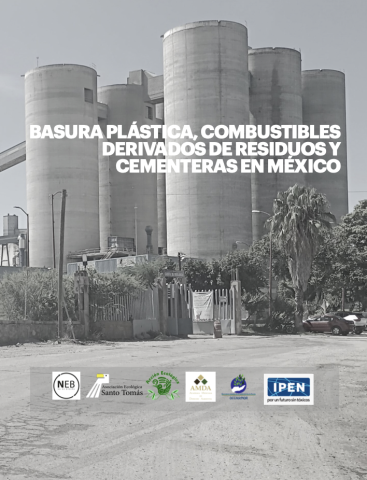Basura Plástica, Combustibles Derivados De Residuos y Plantas Cementeras

Plastic waste, Refuse derived fuels (RDF), and cement kilns.
Excerpts from the Executive Summary
March, 2023
This document describes findings of an ongoing investigation to understand the scale and scope of the use of plastic waste as fuel in industrial processes in Mexico, the so-called refuse-derived fuel (RDF).
The results of this first stage of the investigation are as follows.
- Regarding the magnitude of waste imports in Mexico, there are records that in two of the key tariff fractions to track international trade flows to produce non-conventional fuels derived from waste, there was a significant increase mainly from the United States– data from the Mexican government shows an increase of 124% between 2019 and 2021 in one large waste category.
- An alarming fact is that currently, the SEMARNAT receives from 8,000 to 10,000 authorization requests per year for the import and export of waste.
- According to public information provided by the environmental authority, the only company importing CDR that has an import permit is Samex Recycling Tecnologies S.A. de C.V. located in Tijuana (see Annex 4), but it does not appear with that name in the foreign trade databases analyzed.
- Companies that use and/or manufacture RDF in Mexico may be operating under a legal loophole. As CDR is a mixture of special handling waste (household and hazardous wastes), it is not clearly defined by law.
- Using the Basic Information Package of the INEGI Geostatistical Framework 2020, 33 sites and/or facilities located in 19 states of the Mexican Republic that operate energy coprocessing and "recycling" processes were mapped. The maps show the proximity to the urban and rural settlements that are being impacted.
- It is necessary to carry out health evaluations and diagnostics in the populations near cement facilities that are co-processing refuse-derived fuels (RDF).
- It is important to link refuse-derived fuels (RDF) with their content of hazardous substances, their contribution to climate change and pollutant emissions, and to dismantle the narrative of cement companies to position their use in relation to energy efficiency, climate and sustainability actions.
Click below for the full report and summary.
This report relates to the Sustainable Development goals 3, 6, 8, 9, 11, 12 and 16.
Special thanks to IPEN's Latin America & the Caribbean Regional Coordinator Fernando Bejarano and Regional Hub RAPAM for their support to the project and the lead organization developing this report, Accion Ecologica, for their important contributions to the development and finalization of the project.
| Attachment | Size |
|---|---|
| 10.4 MB | |
| 130.38 KB |
